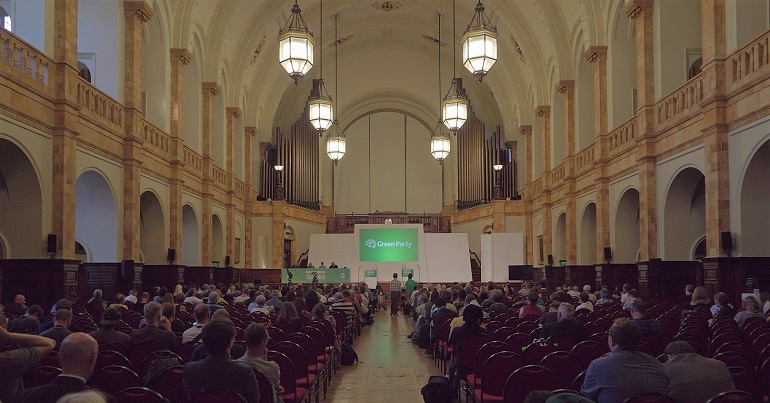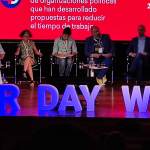Where should Policy Fest sit in the Green Party’s broken policy making structures?

This year’s edition of the Green Party of England and Wales’ Policy Fest felt very different to previous years and, naturally, in depth interaction was limited. At the same time, being forced online opened the event up to much wider participation. To the great credit of activists and the organisers, it still felt full of energy.
Despite the dynamism displayed at this event, however, its present is still very much in the shadow of the large questions that loom over its future.
What is Policy Fest
Policy Fest is a somewhat unusual event in the Green Party calendar. It serves as a gathering for developing policy, in part as a collective forum for the various internal policy working groups. Yet Policy Fest currently has no formal role in party policy making structures.
Organised by the newly constituted policy development committee under Vix Lowthion at short notice, this year’s literation was a mixture of sessions run by policy development committees and a number of cross cutting events.
Given the wide range of Green party policy, sessions ranged across a range of themes.
A collection of sessions delved into details of the concepts and principles that underpin Green Party policy. Over 100 members attended a session on rationing instruments vs tax instruments. An interactive session with the Green Party trade union group looked at how to build worker power in local councils. And there were three hours looking at ideas around economic degrowth and transitioning economic measurement away from a focus on Gross Domestic Product.
Other sessions focused more concretely on policy development discussions set to take place at the next party conference. Both the wildlife and habitats, and the asylum and immigration working groups talked though their policy papers, while the land use policy working group’s range of interactive sessions explored their newly developed land use model and how to identify the ideal land use mix to meet the Green Party’s objectives.
A third selection of sessions talked about how to improve the policy process. One such session – chaired by Lowthion – looked at the prospect of formalising the structure of policy working groups and ensuring that they collaborate. Another examined how to build inclusive policy making structures. And another looked at how the Green Party policy community could better work with the Association of Green Councillors.
On the one hand, the disparate nature of the event presents a gratifying picture along with attendance that saw over 400 people sign up. Transcripts of some sessions remain available for Green Party members. However, as the event wore on it became clear in numerous sessions that there remain many unanswered questions that will need to be addressed soon.
Policy making in the time of Covid
The first question was obvious from the outset. When the education policy working group logged on, it was days after the government had performed a U-turn on school openings, days before they would perform another one on school Covid testing and as Green run Brighton & Hove City Council was fighting them over their early years provision while the university sector continued to spiral. In a world where everything is changing so rapidly how can a grassroots, democratically run political party make policy effectively?
Purpose of policy
In a session examining policy working groups’ success, it was repeatedly cited that the Green Party develops and promotes policy before it moves into the mainstream. This pattern can be seen in a whole raft of areas, from renewable energy to the universal basic income, and from a 4 day working week, to the land value tax.
On our final #PolicyFest session of the week yesterday I said that when our policies become that mainstream the @Conservatives adopt them we need to go back an rewrite them
If the Tories adopting our policies you better believe they’ve found a way of making money for themselves https://t.co/IaH10U68aH
— Liam (they/them) (@LEMcClelland) January 18, 2021
However, faced with a climate emergency and a global pandemic, this gradual and unreliable way of influencing politics seems inadequate. More so than at any other time in the party’s history, the Greens can and must do more. As was pointed out in sessions with the Association of Green Councillors and both Green members of the House of Lords, elected (and appointed) Greens can influence things directly with eight local authorities now having Greens as part of their ruling administration administration. Green Party policy – often focused on the national level – needs to be interpreted by 350 councillors around the country for their local circumstances. This spring – pandemic permitting – thousands will be attempting to sell Green Party policy on the doorstep. Much of our policy book is not particularly useful for local councillors and some may even be a liability for candidates.
The role of Policy Fest
To answer these questions requires changing and reforming policy, and Policy Fest was buzzing with ideas around potential directions the party could be taking, from the well-established climate emergency working group to newer groups such as those looking at rights and responsibilities and planning. However, as was explicitly mentioned in the climate emergency group, the Green Party’s policy making process is under significant strain. The last conference ended in recriminations and deadlock with little policy passed. Previous conferences have been cancelled, or else become bogged down in internal procedure. Under the party’s current processes, it seems unlikely that much of the ideas for policy reform being discussed last week will ever be adopted.
The biggest winner this conference has been the wreckers. The stallers. The filibusters.
This has been the most disappointing conference in an eon.
Our first online conference has demonstrated that our Standing Orders need updating for a digital era #gpconf
— Benali Hamdache (@greenbenali) October 11, 2020
Alongside this sits the question of whether Policy Fest should be given a more formal role in Green Party policy making.
These are the questions that loomed over this year’s Policy Fest and – to a large extent – exist outside the direct control of the event itself. The answers will be litigated and decided by the elected bodies within the party and on conference floor.
While that conversation continues, this year’s Policy Fest suggests that – for the moment at least – interest in Green Party policy making is only growing.
PS. We hope you enjoyed this article. Bright Green has got big plans for the future to publish many more articles like this. You can help make that happen. Please donate to Bright Green now.
Image credit: JWSlubbock – Creative Commons




PolicyFest is a fantastic opportunity for new members to dive straight into the issues and debates currently exercising the GPEW, without the formality and rigmarole of full Conference. I rate this as the best online event I have attended and congratulate Vix and her team on their success.